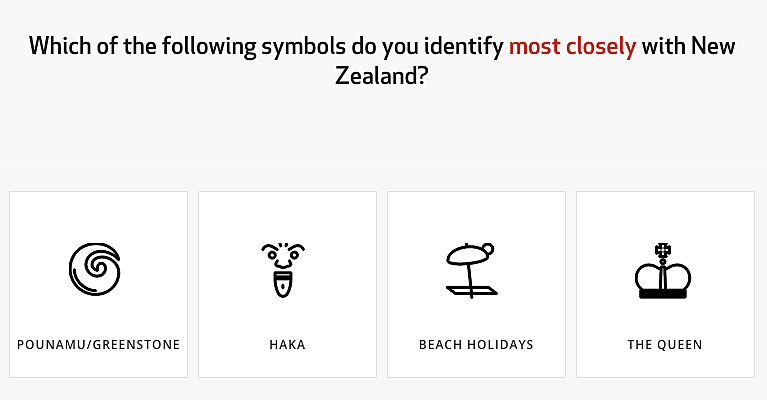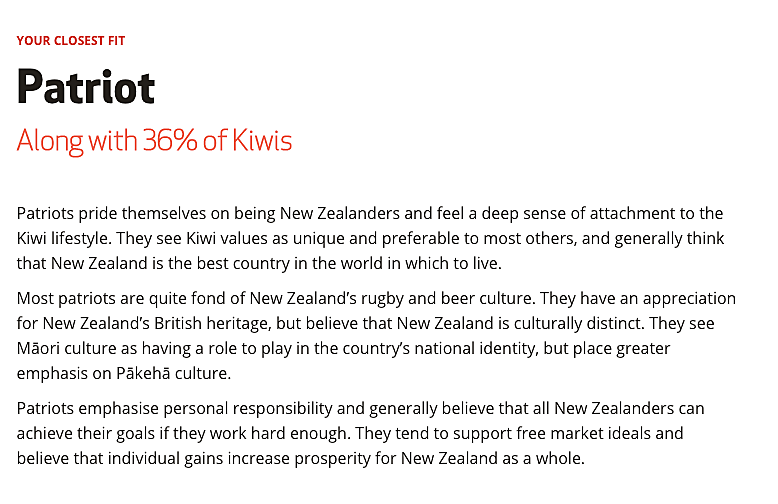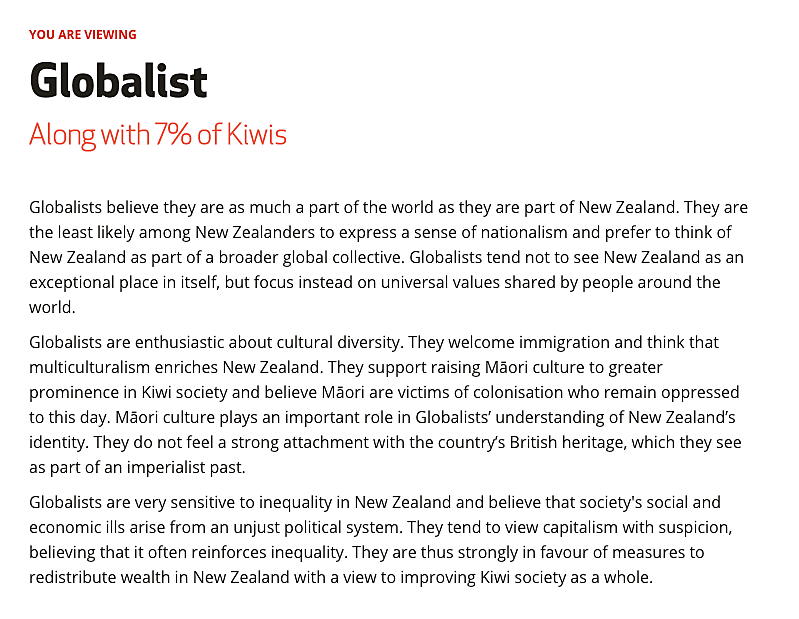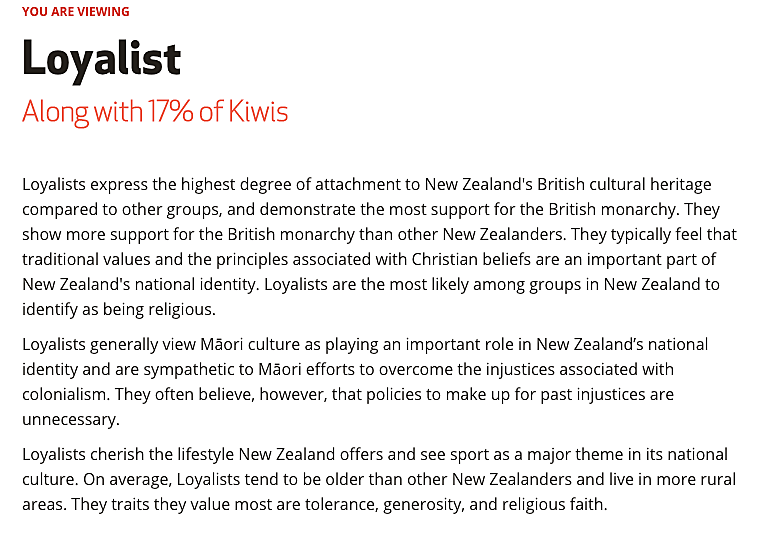Holding Up The Mirror: The Kiwimeter Becomes Us
Joe Nunweek on when big data nationalism goes nowhere
Forget all the hype and the public recrimination, don’t drill down into its question-to-question stumbles. TVNZ’s Kiwimeter is extremely important and good. Improbably teetering on the state broadcaster’s overstuffed content management system, its aesthetic unity is basically a miracle.
The bit where you click on the pictograms forever is like one of those dank 60s sci-fi films where the young people who ace the IQ test will get eaten by the elders. The question about the new flag is a fitting capstone to questions that go, at their deepest, to “society would be better off if people were more religious”.
Even the horrible ‘are you a man or a woman’ question for the purposes of demographics at the end screams attention to detail, like when the re-enactors of forgotten wars get the epaulettes right. It is absolutely astonishing that we don’t get categorised by “tribe” at the end, though it’s bound to have to been in the draft version. What data comes out of this particular exercise in e-nationalism, circa 2016, doesn’t really matter – in its context, this bad baby’s existence already tells us vast amounts about who we are.
So where exactly do exercises like this come from? Getting a snapshot of “who we are” as a nation for practical purposes – that is, for the state’s allocation of housing, education and infrastructure - dates back to the first stirrings of welfarism in the mid 19th-century. The results of a census are utile and hard-headed. As Liam Hogan wrote for the Guardian last year, the data gathered is used by vast numbers of businesses as well. Fuzzy questions of constructing a national identity tended to be subordinate to the immediate questions of “who’s not getting fed” and “who doesn’t have a school to go to”. These big and ambitious projects are increasingly beleaguered, facing longer intervals and replacement with cheaper options. In New Zealand, Britain, Canada, and Australia, censuses are out: Javascript vision quests are in.
Inside Looking Out
Rigorous inquiry into “our values” and “what it means to be x” is a newer field, and (paradoxically) an international one. The World Values Survey, which started in 1981, describes itself as “the largest non-commercial, cross-national, time series investigation of human beliefs ever executed”. Globalists (who shit the bed at the Kiwimeter’s thrilling conclusion, making a scant 7% of the NZ population) rejoice: the WVS is about seeking commonality across borders, and the questions on national pride are really more a matter of anthropological curiosity rather than the raison-damn-d’etre.
In Australia, Monash University’s Scanlon Foundation produces an annual and high-profile Mapping Social Cohesion report that assesses the national population on trust, immigration, asylum seekers and ethnic, religious and cultural diversity. Its methodology uses 50 substantive and 15 demographic questions, and it uses the research findings less as op-ed chaff and more to initiate projects to address those areas (culturally, geographically) where the risk for tension is highest. It’s patently missed a branding trick by not calling itself the Roo-o-meter though, and offers no rich data of any kind on how much Australia values summer at the beach.
Closer to home, the Ministry of Social Development’s Social Report aimed to synthesise multiple sources into a balanced and manageable set of indicators that would be both nationally significant and internationally comparable. It drew on empirical, objective criteria for things like household crowding, income inequality and life expectancy. But there was plenty of perceptive stuff in there too that the TVNZ exercise doesn’t want a bar of – perceived discrimination and corruption, fear of crime, trust in others, satisfaction with leisure time, loneliness.
The Report is a long read, and was discontinued after 2010. As a matter of efficiency, the Kiwimeter understands that you don’t need to be asked questions about how stultifying your downtime is and how lonely you are. By choosing to take an online quiz on a Sunday afternoon, I joined the ranks of 80,000 or so people who could say “very” and “yes”.
Click Patriot
Those figures are big business for old mate TVNZ, a state broadcaster that’s been more concerned with such commercial imperatives than the ABC or BBC for a while now. And really, the mixture of web-first content and old-timey populism is appropriately NZ circa-2016 – a bunch of millennials laboring in a baroque architecture designed to get a product to people older than them, and stoking provincial fires they should know better than to feed (but media jobs are scarce, so hey).
I’ve been in a couple of online newsrooms. No one drafting the questions “immigration is a threat to New Zealand’s culture” and “Māori should not receive special treatment” is actually engaging with them beyond “this will make for good content”. Perversely, the Kiwimeter will probably turn out to be “not great” for social cohesion but a landmark for page impressions.
Which is not to say I (and you) didn’t simply love to do some clicks when this got shared on social media. The online quiz gives you this false hind-brain sense of autonomy that being quizzed on a telephone or simply reading someone else’s very thorough study that you didn’t get to give your $0.02 on does not.
Kiwimeter, then, is a tremendous piece of child’s playacting – you’re acting out constructing and defining a ‘national identity’ using only the toys and parameters the adults gave you. The sheer number of questions about the monarchy make it seem a little bit like the adults ran that “WHAT IS THE BRITISH EMPIRE DOES IT HAVE A PREDESTINED FUTURE” store that used to be in Dominion Road, but you still feel like your own person. Isolating though that can be.
Road to Nowhere
If you discount the accelerationist buzz I got when I nuked the survey data for a fifth consecutive time to get “loyalist”, the Kiwimeter’s big story is the ideological cul-de-sac we’ve found ourselves in. Samuel Johnson once said “patriotism is the last refuge of the scoundrel”; questions of national identity are the last refuge of the diminished state. We’ve retreated from the business of gathering costly public data on costly public projects – even accounting for a referendum, the endless to-do on what we’re about is a cheaper option, a way to nationbuild without building much of anything.
Like the flag change, which we’ve chosen the most anticlimactic time in the country’s history to forge ahead on, the survey is rudderless. It’s so cluelessly endowed with basic status quo soft nationalism it’s kinda beautiful, but it doesn’t want to come off high-Tory; like the big public surveys of old, it wants to show that it’s trading in earnest liberal questions but knows nothing of solutions and consequences. The Kiwimeter (and all our recent flurries of ‘finding ourselves’) embody all our worst individual moments of weakness and panic. Like watching a struggling close friend announce that this is the week they become a yes-person or this is the week they switch to a gluten-free diet, you know there’s something wrong. But you also have a deep, dark feeling they’re not going to fix it.
Years from now, Kiwimeter 2016’s data won’t be good for much more than it is now. I could be wrong, and the impact of mass selection preference for a picture of a pounamu over a picture of a crown might be picked as the moment all old orders were overthrown, the flashpoint of the revolution. I’m probably not. Nevertheless, it’s an emblem of an extremely weird and listless time in our national psyche. Fill it in early, fill it in often.




